Elimination Night Read online
The characters and events portrayed in this book are fictitious. Any similarity to real persons, living or dead, is coincidental and not intended by the author.
Text copyright © 2013 by AnonCorp
All rights reserved.
No part of this book may be reproduced, or stored in a retrieval system, or transmitted in any form or by any means, electronic, mechanical, photocopying, recording, or otherwise, without express written permission of the publisher.
Published by Amazon Publishing
P.O. Box 400818
Las Vegas, NV 89140
ISBN-13: 9781477800102
ISBN-10: 1477800107
This is a work of fiction.
Any similarity to any persons living or dead—or to any real organizations and/or corporations—is coincidental.
The following document was recovered from a laptop computer left in a dumpster behind the offices of Zero Management in Los Angeles.
No one has yet claimed ownership.
The true identity of the author remains unknown.
CONTENTS
Project Icon
1. Becoming Bill
2. A Horrible Farewell
3. Sanity Check
4. The M-Word
5. Bibi and the Boy King of the Bronx
6. Sanity Check: The Sequel
7. The Run-Through
8. Six Things
9. “I Hope You Like Celery”
10. N for Yes
11. The Loneliest Place on Earth
12. Snake Break!
13. Coach Andy
14. Little Green Pills
15. The Moment
16. When They Were Young
17. Lion’s Den
18. Vengeance Enough
19. Fallen Icon
20. Maison Chelsea
21. Bingo-Bitte!
22. Don’t Say We Didn’t Warn You
23. Whatta Man
24. The Talent and the Glory
25. El Woofaleah
26. Room 709
27. Love What You Do
28. Chaz Chipford’s Greatest Hits
29. Wingwoman
Afterward
PROJECT ICON
SEASON THIRTEEN SCHEDULE
July–August
Preauditions
September
The Reveal
November–December
Auditions (with judges)
Early January
Las Vegas Week
Late January
Season Premier
February
Live episodes from Greenlit Studios
May
Season Finale
1
Becoming Bill
September
“LOOK AT ME, Bill,” said Len.
I looked.
“Now, tell me what you see.”
I had no idea where he was going with this. I didn’t really want to know, to be honest with you.
“I see… your face,” I said.
“And tell me, Bill,” Len went on, “is my face betraying any sign, any hint—any indication whatsoever—that I might actually care about the logistical difficulty of performing the task I delegated to you? Is my face telling you that, Bill? Is that what you see?”
“No,” I sighed.
“Good. Now, please give the judges the run-through. And chop-bloody-chop. We’re on in ten.”
With that, Leonard Braithwaite—Supervising Producer of the Most-Watched Television Show on Earth—twirled on his heels like the backup dancer he used to be, and took his ridiculous English accent and even more ridiculous suit over to the other side of the room. Clotted cream and baby blue, that was today’s color scheme—with pinstripes so wide they could have been rolled onto his pants by one of those lawn painting machines they have at Wimbledon.
Len is an asshole, in case you haven’t figured that out already. I would go so far as to say that he’s an asshole’s asshole, such is his lifelong dedication to the craft of assholeness. Len also couldn’t exist anywhere outside of reality TV. Take that faux bronze wet-look man-perm: “The Merm,” as it’s known here backstage. In the non-TV universe, such a hairstyle would be nearing the outer limits of credibility if its owner were merely approaching middle age. As it is, Len can’t be a day under seventy-five. It’s the teeth that give it away: an unnatural shade of white, with the lumpy, thick-grained texture of medieval church cabinetry.
I stared at the clipboard in my hand, as if that might somehow make the next ten minutes of my life any easier. Attached was the run-through Len had just mentioned: a twelve-page script for the eleven o’clock press conference, which would take place in the auditorium downstairs and would be streamed live on the Internet to a worldwide audience of two hundred million people (or so the Rabbit network was optimistically claiming). If you believed ShowBiz magazine—the holy text of industry gossip that lands on every desk in Hollywood once a week—an entire billion-dollar-a-year franchise depended on our not screwing this up. As, therefore, did all our jobs. So it was strange that Len wanted to put me in charge of the run-through. It wasn’t unusual for him to over-delegate, of course: He did it all the time, usually so he could take one of his five-hour lunch breaks at Mr. Chang’s. But today was different.
Today mattered.
I tried to calm myself. What was it my old meditation tutor used to say? “Imagine yourself as a majestic mountain.” I closed my eyes and pictured Everest, but my inner mountain wasn’t cooperating. Besides, when I first moved to LA, I promised myself I’d never turn into the kind of person who would say “imagine yourself as a majestic mountain” unless in mockery. So instead I just stood there, watching as four crew guys carried a vast airbrushed banner—in colors that looked suspiciously like the branding of a certain global hamburger chain—through the pre-show lounge area. “PROJECT ICON: THE DREAM REAWAKENS! ” it read.
Len had told me to fire the sign writer weeks ago. I had yet to find the right moment.
“Nine minutes until we’re on!” a voice behind me yelled.
I had to do the run-through. If only I hadn’t left my jar of little green pills in the bathroom cabinet at home. How else was I going to find the courage to address a room full of celebrities? Unless… unless I did what I’d been fantasizing about since my very first day at Project Icon, and quit. It wasn’t like I owed anyone here anything. I could just walk out, right now. I’d be at the baggage carousel at Honolulu International before dinner. Then a fifteen-minute taxi ride to Waikiki Beach, and then—oh, yes!—one of my sweet, handsome Brock’s frontal lobotomy mai tais, served under the hundred-year-old kiawe tree in the bar of the Huakuwali Hotel to the romantic, albeit slightly cheesy rhythm of hula music.
Only that wasn’t the plan.
No, the plan was to keep working, keep saving, until I had enough in the bank to leave this place and never come back.
Only then could I get on that plane.
So my name isn’t actually Bill, just FYI. It’s Sasha. Bill was—sorry, is—the name of my immediate boss, Bill Redmond, whose duties as assistant producer of Project Icon are now mine, or at least until Bill gets out of the ER at Denver General Medical Center.
Long story.
Len calls me Bill because he didn’t want there to be any confusion during the “transition of responsibilities.” Which means to say: Len calls me Bill because he thinks of his employees as being basically interchangeable. “That’s just how things are, Bill, when you work in live television,” he once explained to me. But really that’s just how things are when you work for Len, whose Repulsive Personality Field seems to have doubled in strength since he returned to the show for its thirteenth—and almost certainly final—season.
And so: Back in June,
on the morning of that unfortunate incident in Denver, I, Sasha King—the pale, red-curled, non-girliest girl ever to work in live entertainment—became Bill. Or “acting assistant producer,” to use my official title, which no one does. The “acting” bit means I get the double privilege of responsibilities—serious, one-hour-of-sleep, lifespan-shortening responsibilities—while still being relied on for menial tasks, such as procuring obscure fried meat products for homesick Southern contestants or collecting Len’s eighteen-month-old adopted Congolese orphan from his nightly Bikram yoga class.
No, Mom really couldn’t believe it when I took this job.
“Since when have you wanted anything to do with show business?” she asked, spitting vodka everywhere. “You’ve never cared about glam or glitz in your life! You don’t even wear makeup, dear. I thought you wanted to be a writer, like that man—y’know, the one who wrote that depressing book you’re always carrying around with you, Never-ending Misery.”
“It’s One Hundred Years of Solitude, Mom,” I sighed. “And it’s not depressing. It’s the greatest novel ever written. Dad gave it to me for my sixteenth birthday.”
“This is just very… unlike you, dear. What about Brock? Is he going to LA, too?”
“No, Mom. Brock’s not coming with me. He’s moving to… look, it doesn’t matter. This is a short-term thing. If I’m ever going to finish my novel, I need to take some time off. And for that, I need some money. The student loans are gone, Mom.”
“What about your inheritance?”
“Jesus, Mom. Dad left me four dollars and half a pack of Camel Lights.”
“I thought he left you his moose socks, too?”
“And the moose socks, yes.”
Mom did have a point about all of this, of course: Growing up in the fishing hamlet of Babylon, Long Island—with its peeling paintwork, Babylicious Crab Cakes, and twice-weekly hurricanes—I mocked anyone with an interest in celebrities. Even as an infant (or so I’ve been told) I considered most forms of popular entertainment beneath me. Rattles? Meh. Stuffed animals? Please. Life was a serious business, as far as Baby Me was concerned, requiring deep thought and a frown at all times. Even a giggle was asking too much: If you tickled my belly, I would grunt and try my best to punch you in the face. (Dad found infinite amusement in this, judging by the camcorder footage.) Things didn’t change much as I got older. I preferred the Discovery Channel to the Mickey Mouse Club, the spelling bee to the cheerleading squad, The Times’ op-ed page to the sex quiz in Seventeen. Full-blown nerdism, in other words.
Nevertheless, by the time I got to high school—where I hung with the cooler of the uncool kids—my knowledge of early seventies Tom Waits albums and appreciation for Lou Reed’s experimental period gave me a certain kind of credibility with a certain kind of boy… and of course it did no harm that by then I’d learned how to manage my inextinguishable wildfire of orange curls, or that I’d inherited Dad’s nerves, which kept me on the bonier side of slim despite a lifelong pastry habit. (Unfortunately, this effect is no longer quite as reliable as it once was.)
As for college: Well, I was an okay student… but a little cocky. “Jesus, Sash, even your irony is ironic,” as Dad used to say. A classic teenage self-defense mechanism, of course. But this was lost on the admissions officers of the prestigious schools to which I applied. They took it as detachment or over-confidence, maybe both. Hence my place at the J-School you won’t have heard of, half the tuition paid for with loans, the other half by Mom, who had worked double-time shoveling meds as a Walgreens pharmacist for the best part of a decade to make sure her only child went to college. (Shockingly, Dad’s “career” as a wedding trumpeter didn’t contribute much in the higher education department, unless you count the time he sent me a plastic-wrapped tray of hallucinogenic cookies.)
Suffice it to say, I was turned down for internships at all our nation’s great metropolitan newspapers, and quite a few of the not-so-great ones, too. Same story with the big magazines. And the TV news networks. Then Dad’s Irish peasant genes went and gave him cancer, and shortly after that god-awful funeral in the church he’d been to only once before, I embarked on my Novel of Immense Profundity. Or rather, I spent a year living at home, staring tearfully at an empty Word document. I wanted my book to be epic. A generation-spanning masterpiece. Something Gabriel García Márquez himself might have written. The problem was, I couldn’t decide where to set it. Long Island seemed too obvious. Aside from college, however, I’d never really been anywhere else before…
I was saved from this indecision by Brock—calm, funny, excitingly toned Brock Spencer Daniels—whose frat buddy worked at Rabbit News and was looking for a talent booker’s assistant. Before I knew it, I’d been offered the job—if the word “job” can be used to describe a position whose salary consisted of a MetroCard and a daily canteen allowance. My first assignment: help organize a panel interview with the cast and crew of Project Icon, led by none other than Leonard Braithwaite.
A couple of months later, Len called my cell (I hadn’t given him the number) to offer me a “dazzling opportunity in Hollywood, California.”
“I bet they’ve got you working for free over there at Rabbit, haven’t they?” he chuckled.
“Yes,” I admitted (stupidly).
“Well, then—I think we can offer you a raise,” he replied. “How does more than nothing sound?”
The line went fuzzy with laughter. To Len, the world’s funniest joke is the one he’s just told.
The money he offered wasn’t good, but it was good enough for Brock and me to hatch a plan: He’d move to Honolulu to focus on his “surfing career” (while making cocktails on the weekends and finding us a place to live), and I’d take the job at Icon until my savings account was refilled. Then I’d join him beachside to finish my novel. He’d win the MegaWave Super Crown. I’d win the Most Immensely Profound Novel of Our Generation Award.
We had it all worked out.
So off I went to LA.
“Another one of Len’s Lovelies, huh?” sneered the vinegar-faced woman in Icon’s accounts department on my very first morning. “Funny—they’re usually blondes, not redheads. His standards must be slipping.”
I didn’t know it at the time, but I had just met Len’s wife.
2
A Horrible Farewell
I CHECKED THE TIME on my cell phone: Barely seven minutes to go now before the press conference—or “The Reveal” as Len insisted on calling it—was due to start.
The run-through.
Must do the run-through…
I began speed walking down a yellowing hallway, wondering vaguely if the exercise might spare me yet another depressing visit to the Starlight Gym on Hollywood Boulevard—which typically involved an hour of heavy breathing on an elliptical machine while staring at the absolute perfection of some cow town beauty queen’s Lycra-encased buttocks. I could definitely have used something to burn the dumpster-sized box of sticky buns that I had emptied into my digestive system earlier, when I thought Len wasn’t there. (No such luck. “Look, everyone, here comes Miss Cinnabon!” he’d boomed over the PA system during rehearsal.)
The corridor dead-ended.
Where the hell were the dressing rooms?
I wished for a moment we were on the more familiar territory of Greenlit Studios. It would be months before we reached that stage of the competition, however. For now, Project Icon was still touring from city to city, prescreening potential contestants. This week, conveniently, we were in LA—but we needed a venue with a big enough parking lot for the “cattle call” of mostly delusional masochists who wanted to line up all day for the opportunity to be insulted on TV. That’s why Len had rented The Roundhouse, a big old concrete arena down by the oil fields. The place had originally been designed to resemble a Roman coliseum, only they’d slathered the entire thing in cheap sixties stucco, so now it just looked like a giant overflowing porridge bowl.
“Six minutes!”
Shit.<
br />
Another corridor.
I broke into an undignified half-jog, half-run. At last, after turning a corner, there they were… two doors, side-by-side, a golden star on each. Pushing my hair back from my eyes, I tried to breathe deeply from my abdomen. “You’re a majestic mountain,” I told myself. Then I knocked twice loudly, in an attempt to project confidence, before flicking through the sheaf of papers on my clipboard, one last time. Len’s notes were underlined in the right-hand margin:
11AM: HOUSE LIGHTS DOWN
On time, please!
11.05AM: VIDEO PACKAGE
Slow motion clips of previous Project Icon winners/contestants, set to Carl Orff’s “O Fortuna.”
Bill—this isn’t Carnegie fucking Hall.
Anything weepy and out of copyright will do.
11.07AM: INTRODUCTION
WAYNE SHORELINE (HOST)
Welcome, welcome everyone. This… [long pause] is season thirteen… [even longer pause] of PROJECT ICON! And I am your host, Wayne Shoreline, at your humble service. So, by now the whole world knows our incredible story: How the business genius Sir Harold Killoch discovered an obscure TV talent contest in Belgium—featuring a revolutionary system of telephone voting—and brought it here to the Rabbit network in America, where it shot to the top of the prime-time ratings and became a worldwide sensation. [Audience goes wild. Close-up of Sir Harold smiling front of house.]
Bill—talk to the smile-coach again.
Need Sir H. to look more Cuddly Grandpa,
less Dark Lord of Evil.
And who could forget our original, iconic lineup of judges? America’s favorite uncle, JD Coolz [applause]; the beautiful and dare I say sometimes a little unpredictable Pamela Crabtree Wayne—double-check with legal for approved crack-head euphemisms. and of course “Mr. Horrible” himself, our erect-nippled Scottish friend Nigel Crowther…
[Audience boos]
Bill—let this run a bit.… Erect-nippled—really?
Over the years our show has gone through lots of changes—most dramatically when Nigel sadly left the judging panel last year to pursue other opportunities at the Rabbit network. We wish him all the very best, of course, and we’re sure he’ll have many, many more successes. Wayne—NO FUCKING SARCASM. But one thing has remained a constant: Our NUMBER ONE ratings. So! [Tense music.] Back to the news that everyone has been waiting for. There has been talk. There have been rumors. We’ve all heard mention of many, many names. But now, finally, here in this room, we can reveal WHO will be sitting in the judges’ chairs over the coming months, helping us find.… [another pause] the next winner… [pause again, spoolup title theme] of PROJECT ICON!

 Goody Two-Shoes
Goody Two-Shoes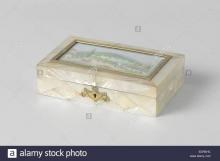 The Pearl Box
The Pearl Box And when you gone...
And when you gone... Stranger At The Other Corner
Stranger At The Other Corner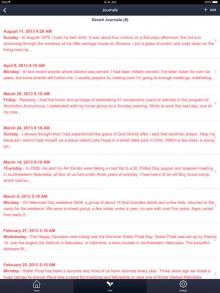 My Young Days
My Young Days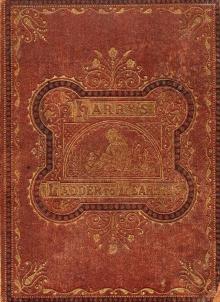 Harry's Ladder to Learning
Harry's Ladder to Learning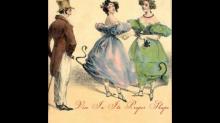 Vice in its Proper Shape
Vice in its Proper Shape_preview.jpg) Promise (the curse)
Promise (the curse)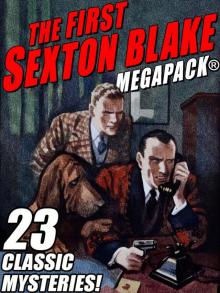 The First Sexton Blake
The First Sexton Blake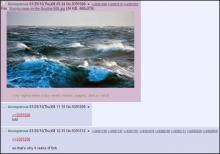 Golden Moments
Golden Moments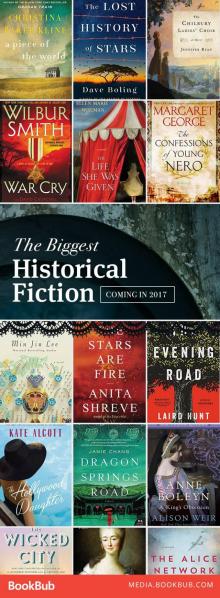 Hildebrand; or, The Days of Queen Elizabeth, An Historic Romance, Vol. 2 of 3
Hildebrand; or, The Days of Queen Elizabeth, An Historic Romance, Vol. 2 of 3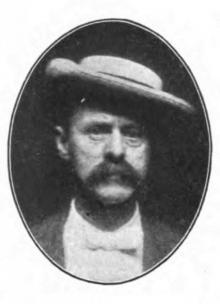 The Ice Queen
The Ice Queen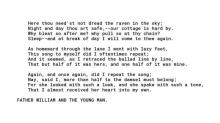 Phebe, the Blackberry Girl
Phebe, the Blackberry Girl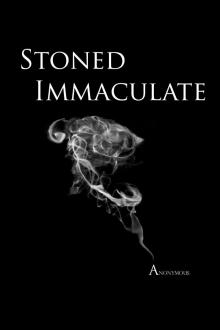 Stoned Immaculate
Stoned Immaculate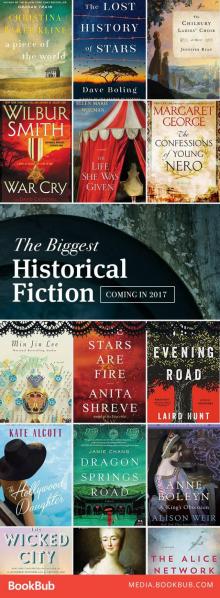 Hildebrand; or, The Days of Queen Elizabeth, An Historic Romance, Vol. 3 of 3
Hildebrand; or, The Days of Queen Elizabeth, An Historic Romance, Vol. 3 of 3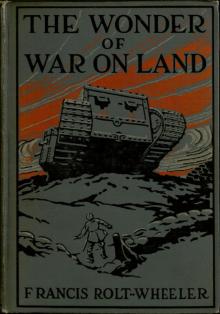 The Wonder of War on Land
The Wonder of War on Land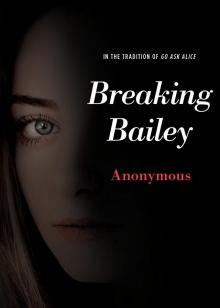 Breaking Bailey
Breaking Bailey The Little Girl Who Was Taught by Experience
The Little Girl Who Was Taught by Experience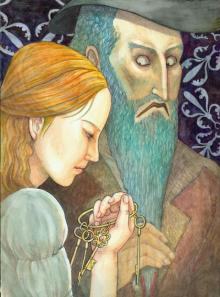 The Popular Story of Blue Beard
The Popular Story of Blue Beard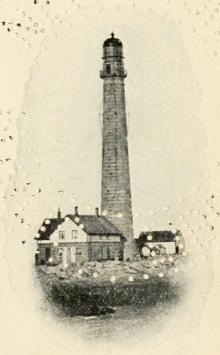 The Life Savers: A story of the United States life-saving service
The Life Savers: A story of the United States life-saving service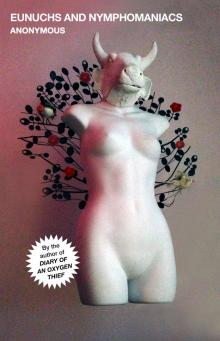 Eunuchs and Nymphomaniacs
Eunuchs and Nymphomaniacs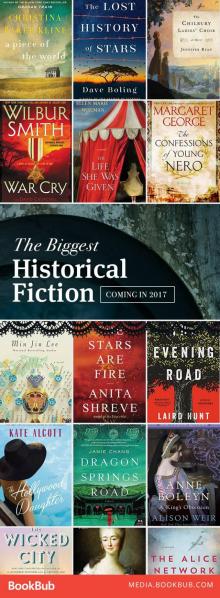 Hildebrand; or, The Days of Queen Elizabeth, An Historic Romance, Vol. 1 of 3
Hildebrand; or, The Days of Queen Elizabeth, An Historic Romance, Vol. 1 of 3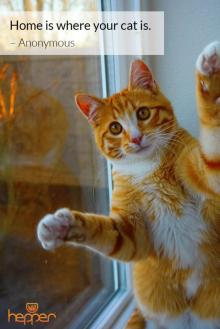 Kitty's Picnic, and Other Stories
Kitty's Picnic, and Other Stories Two Yellow-Birds
Two Yellow-Birds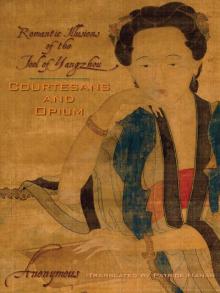 Courtesans and Opium
Courtesans and Opium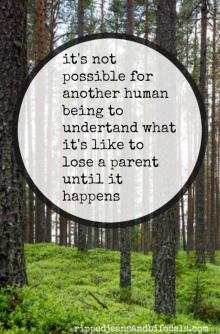 The Emigrant's Lost Son; or, Life Alone in the Forest
The Emigrant's Lost Son; or, Life Alone in the Forest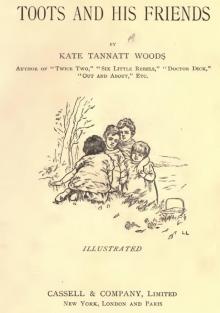 Toots and His Friends
Toots and His Friends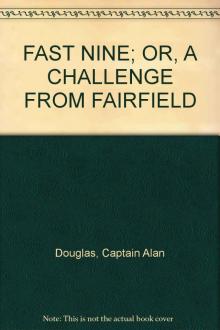 Fast Nine; or, A Challenge from Fairfield
Fast Nine; or, A Challenge from Fairfield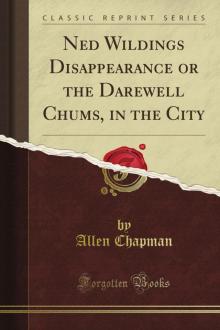 Ned Wilding's Disappearance; or, The Darewell Chums in the City
Ned Wilding's Disappearance; or, The Darewell Chums in the City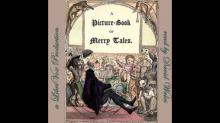 A Picture-book of Merry Tales
A Picture-book of Merry Tales The Trail of The Badger: A Story of the Colorado Border Thirty Years Ago
The Trail of The Badger: A Story of the Colorado Border Thirty Years Ago Peter Parley's Visit to London, During the Coronation of Queen Victoria
Peter Parley's Visit to London, During the Coronation of Queen Victoria The Rainbow, After the Thunder-Storm
The Rainbow, After the Thunder-Storm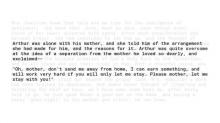 Arthur Hamilton, and His Dog
Arthur Hamilton, and His Dog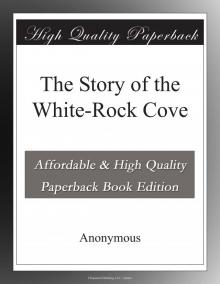 The Story of the White-Rock Cove
The Story of the White-Rock Cove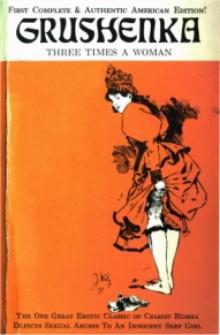 Grushenka. Three Times a Woman
Grushenka. Three Times a Woman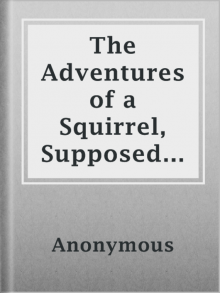 Adventures of a Squirrel, Supposed to be Related by Himself
Adventures of a Squirrel, Supposed to be Related by Himself Falling in Love...Again
Falling in Love...Again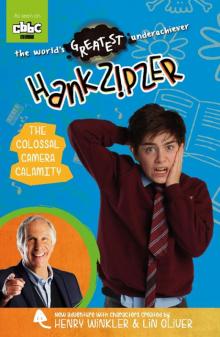 The Colossal Camera Calamity
The Colossal Camera Calamity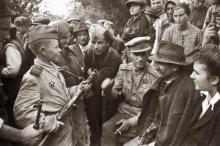 Child of the Regiment
Child of the Regiment Elimination Night
Elimination Night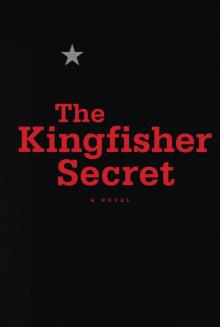 The Kingfisher Secret
The Kingfisher Secret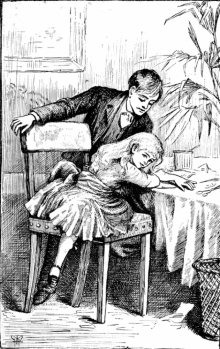 Left to Ourselves; or, John Headley's Promise.
Left to Ourselves; or, John Headley's Promise.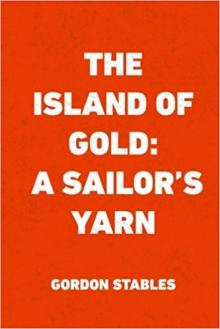 The Island of Gold: A Sailor's Yarn
The Island of Gold: A Sailor's Yarn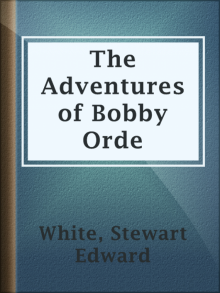 Adventures of Bobby Orde
Adventures of Bobby Orde Twain, Mark: Selected Obituaries
Twain, Mark: Selected Obituaries When Love Goes Bad
When Love Goes Bad The Incest Diary
The Incest Diary Calling Maggie May
Calling Maggie May The Infidelity Diaries
The Infidelity Diaries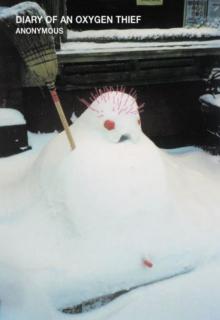 Diary of an Oxygen Thief (The Oxygen Thief Diaries)
Diary of an Oxygen Thief (The Oxygen Thief Diaries) ARABELLA
ARABELLA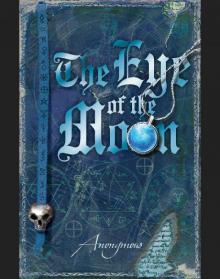 The Eye of the Moon
The Eye of the Moon Dara
Dara THE ALTAR OF VENUS: The Making of a Victorian Rake
THE ALTAR OF VENUS: The Making of a Victorian Rake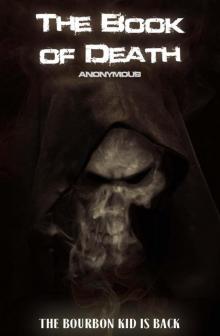 The Book of Death
The Book of Death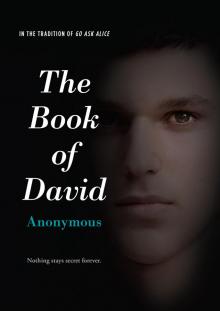 The Book of David
The Book of David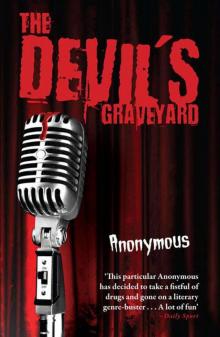 The Devil's Graveyard
The Devil's Graveyard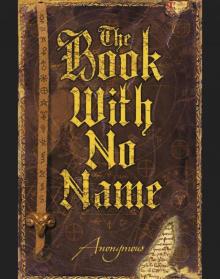 The Book With No Name
The Book With No Name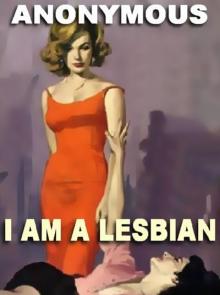 I Am A Lesbian
I Am A Lesbian Njal's Saga
Njal's Saga The Epic of Gilgamesh
The Epic of Gilgamesh Darling
Darling Tal, a conversation with an alien
Tal, a conversation with an alien Go Ask Alice
Go Ask Alice Aphrodizzia
Aphrodizzia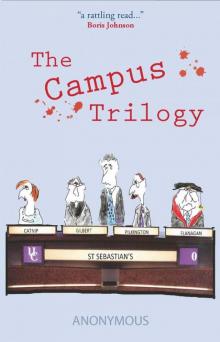 The Campus Trilogy
The Campus Trilogy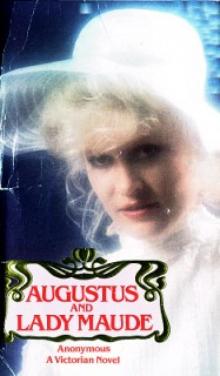 Augustus and Lady Maude
Augustus and Lady Maude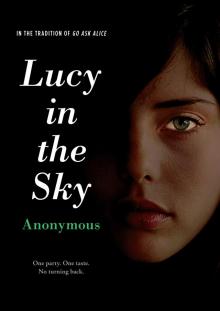 Lucy in the Sky
Lucy in the Sky Sight Unseen
Sight Unseen Pleasures and Follies
Pleasures and Follies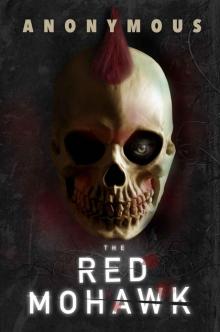 The Red Mohawk
The Red Mohawk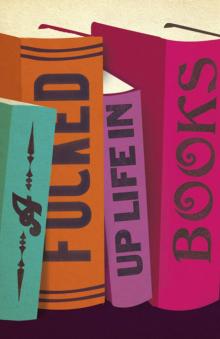 A Fucked Up Life in Books
A Fucked Up Life in Books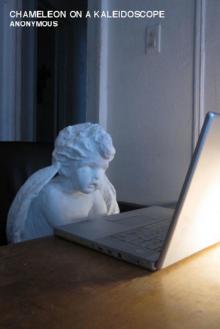 Chameleon On a Kaleidoscope (The Oxygen Thief Diaries)
Chameleon On a Kaleidoscope (The Oxygen Thief Diaries) Astrid Cane
Astrid Cane BEATRICE
BEATRICE The Song of the Cid
The Song of the Cid